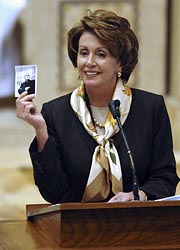Archbishop Wuerl on Pelosi

PoliticsDaily.com editor in chief Melinda Henneberger posted an article last week based on an interview with Archbishop Donald Wuerl of Washington, D.C.
Archbishop Wuerl explains why, in his judgment, it’s not proper to deny Communion to Catholic politicians like Nancy Pelosi if they present themselves for Communion.
The archbishop says that’s not the way the Church has traditionally dealt with the problem of prominent Catholics who cause scandal by their refusal to conform with fundamental matters of faith and morals and their reception of Communion.
Along with disputing that Canon 915 requires the denial of Communion to people like Pelosi, as argued by Archbishop Raymond Burke, Archbishop Wuerl also said he’s not impelled to take action with respect to Pelosi because her permanent home is in the Archdiocese of San Francisco, not in Washington.
(Henneberger’s article is quite informative, but she makes an error of fact in stating Archbishop Burke “as archbishop of St. Louis told Health and Human Services Secretary Kathleen Sebelius that unless she fell in line on abortion, she couldn’t join the Communion line on Sunday.” Actually it was Sebelius’s own bishop, Archbishop Robert Naumann of Kansas City in Kansas, who issued a public statement in May 2008 requesting Sebelius not seek to receive Communion in his archdiocese because of her public support for abortion.)
Speaking in November about the issue of denying Communion to pro-abortion politicians like Pelosi, Archbishop Charles Chaput provided a useful comment that serves to frame what’s really being debated by the U.S. bishops in their approach to the issue.
“I don’t think there’s any differences among the bishops about pro-choice Catholics presenting themselves for Communion,” Archbishop Chaput said. “They shouldn’t do it.”
Added Archbishop Chaput, “That’s not what the debate’s about among bishops. Because if you’re not in union with the Church on the serious issues of faith and morals, you shouldn’t receive Communion, whether you’re a bishop or a private citizen, a simple Catholic or a politician who claims to be Catholic. The differences among the bishops is whether they should be refused holy Communion if they present themselves anyway.”













